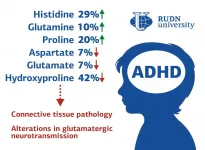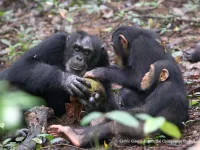(Press-News.org) Bottom Line: Genetic mutations indicative of DNA damage were associated with high red meat consumption and increased cancer-related mortality in patients with colorectal cancer.
Journal in Which the Study was Published: Cancer Discovery, a journal of the American Association for Cancer Research
Author: Marios Giannakis, MD, PhD, an assistant professor of medicine at Harvard Medical School and a physician at Dana-Farber Cancer Institute
Background: "We have known for some time that consumption of processed meat and red meat is a risk factor for colorectal cancer," said Giannakis. The International Agency for Research on Cancer declared that processed meat was carcinogenic and that red meat was probably carcinogenic to humans in 2015.
Experiments in preclinical models have suggested that red meat consumption may promote the formation of carcinogenic compounds in the colon, but a direct molecular link to colorectal cancer development in patients has not been shown, Giannakis explained. "What is missing is a demonstration that colorectal cancers from patients have a specific pattern of mutations that can be attributed to red meat," he said. "Identifying these molecular changes in colon cells that can cause cancer would not only support the role of red meat in colorectal cancer development but would also provide novel avenues for cancer prevention and treatment."
How the Study was Conducted: To identify genetic changes associated with red meat intake, Giannakis and colleagues sequenced DNA from matched normal and colorectal tumor tissues from 900 patients with colorectal cancer who had participated in one of three nationwide prospective cohort studies, namely the Nurses' Health Studies and the Health Professionals Follow-Up Study. All patients had previously provided information on their diets, lifestyles, and other factors over the course of several years prior to their colorectal cancer diagnoses.
Results: Analysis of DNA sequencing data revealed the presence of several mutational signatures in normal and cancerous colon tissue, including a signature indicative of alkylation, a form of DNA damage. The alkylating signature was significantly associated with pre-diagnosis intake of processed or unprocessed red meat, but not with pre-diagnosis intake of poultry or fish or with other lifestyle factors. Red meat consumption was not associated with any of the other mutational signatures identified in this study. In line with prior studies linking red meat consumption with cancer incidence in the distal colon, Giannakis and colleagues found that normal and cancerous tissue from the distal colon had significantly higher alkylating damage than tissue from the proximal colon.
Using a predictive model, the researchers identified the KRAS and PIK3CA genes as potential targets of alkylation-induced mutation. Consistent with this prediction, they found that colorectal tumors harboring KRAS G12D, KRAS G13D, or PIK3CA E545K driver mutations, which are commonly observed in colorectal cancer, had greater enrichment of the alkylating signature compared to tumors without these mutations. The alkylating signature was also associated with patient survival: Patients whose tumors had the highest levels of alkylating damage had a 47 percent greater risk of colorectal cancer-specific death compared to patients with lower levels of damage.
Author's Comments: "Our study identified for the first time an alkylating mutational signature in colon cells and linked it to red meat consumption and cancer driver mutations," said Giannakis. "These findings suggest that red meat consumption may cause alkylating damage that leads to cancer-causing mutations in KRAS and PIK3CA, thereby promoting colorectal cancer development. Our data further support red meat intake as a risk factor for colorectal cancer and also provide opportunities to prevent, detect, and treat this disease."
Giannakis explained that if physicians could identify individuals who are genetically predisposed to accumulating alkylating damage, these individuals could be counseled to limit red meat intake as a form of precision prevention. In addition, the alkylating mutational signature could be used as a biomarker to identify patients at greater risk of developing colorectal cancer or to detect cancer at an early stage. Because of its association with patient survival, the alkylating signature may also have potential as a prognostic biomarker. However, future studies are needed to explore these possibilities, Giannakis noted.
Study Limitations: A limitation of the study is the potential selection bias of study participants, as tissue specimens could not be retrieved from all incident colorectal cancer cases in the cohort studies. Current studies from Giannakis and his colleagues are exploring the potential role of red meat intake and alkylating damage in diverse groups of patients.
Funding & Disclosures: The study was supported by the National Institutes of Health, the Stand Up To Cancer Colorectal Cancer Dream Team Translational Research Grant (co-administered by the AACR), the Project P Fund, the Cancer Research UK Grand Challenge Award, the Nodal Award from the Dana-Farber Harvard Cancer Center, the Friends of the Dana-Farber Cancer Institute, the Bennett Family Fund, and the Entertainment Industry Foundation through the National Colorectal Cancer Research Alliance and Stand Up To Cancer.
Giannakis has received research funding from Bristol-Myers Squibb, Merck, Servier, and Janssen unrelated to this study.
INFORMATION:
About the American Association for Cancer Research
Founded in 1907, the American Association for Cancer Research (AACR) is the world's first and largest professional organization dedicated to advancing cancer research and its mission to prevent and cure cancer. AACR membership includes 48,000?laboratory, translational, and clinical researchers; population scientists; other health care professionals; and patient advocates residing in 127 countries. The AACR marshals the full spectrum of expertise of the cancer community to accelerate progress in the prevention, diagnosis, and treatment of cancer by annually convening more than 30 conferences and educational workshops--the largest of which is the AACR Annual Meeting, with more than 74,000 attendees for the 2020 virtual meetings and more than 22,500 attendees for past in-person meetings. In addition, the AACR publishes nine prestigious, peer-reviewed scientific journals and a magazine for cancer survivors, patients, and their caregivers. The AACR funds meritorious research directly as well as in cooperation with numerous cancer organizations. As the Scientific Partner of Stand Up To Cancer, the AACR provides expert peer review, grants administration, and scientific oversight of team science and individual investigator grants in cancer research that have the potential for near-term patient benefit. The AACR actively communicates with legislators and other policymakers about the value of cancer research and related biomedical science in saving lives from cancer. For more information about the AACR, visit?http://www.AACR.org.
HOUSTON ? Preclinical research from The University of Texas MD Anderson Cancer Center finds that although glioblastoma stem cells (GSCs) can be targeted by natural killer (NK) cells, they are able to evade immune attack by releasing the TFG-β signaling protein, which blocks NK cell activity. Deleting the TFG-β receptor in NK cells, however, rendered them resistant to this immune suppression and enabled their anti-tumor activity.
The findings, published today in the Journal of Clinical Investigation, suggest that engineering NK cells to resist immune suppression may be a feasible path ...
The energy density of traditional lithium-ion batteries is approaching a saturation point that cannot meet the demands of the future - for example in electric vehicles. Lithium metal batteries can provide double the energy per unit weight when compared to lithium-ion batteries. The biggest challenge, hindering its application, is the formation of lithium dendrites, small, needle-like structures, similar to stalagmites in a dripstone cave, over the lithium metal anode. These dendrites often continue to grow until they pierce the separator membrane, causing the battery to short-circuit and ultimately destroying ...
Nitrogen from agriculture, vehicle emissions and industry is endangering butterflies in Switzerland. The element is deposited in the soil via the air and has an impact on vegetation - to the detriment of the butterflies, as researchers at the University of Basel have discovered.
More than half of butterfly species in Switzerland are considered to be at risk or potentially at risk. Usually, the search for causes focuses on intensive agriculture, pesticide use and climate change. A research team led by Professor Valentin Amrhein from the University of Basel, however, has been investigating another factor - the depositing ...
Living beings are continuously exposed to harmful agents, both exogenous (ultraviolet radiation, polluting gases, etc.) and endogenous (secondary products of cellular metabolism) that can affect DNA integrity. That's why cells are endowed with a series of molecular mechanisms whose purpose is to identify and signpost possible damage to the genetic material for speedy repair. These mechanisms are precisely regulated because they are key to cell survival. In extreme situations of massive and irreparable damage, cells enter a phase of controlled dismantling called "programmed cell death". Among the events that take place during this process is the massive delivery to the cytoplasm of a mitochondrial protein called cytochrome C. Under homeostatic conditions, this protein plays a role in energy ...
The 2018 Nobel Prize in Physics was shared by researchers who pioneered a technique to create ultrashort, yet extremely high-energy laser pulses at the University of Rochester.
Now researchers at the University's Institute of Optics have produced those same high-powered pulses--known as chirped pulses--in a way that works even with relatively low-quality, inexpensive equipment. The new work could pave the way for:
Better high-capacity telecommunication systems
Improved astrophysical calibrations used to find exoplanets
Even more accurate atomic clocks
Precise devices for measuring chemical contaminants in the atmosphere
In a paper in Optica, the researchers describe the first demonstration ...
Peatlands are an important ecosystem that contribute to the regulation of the atmospheric carbon cycle. A multidisciplinary group of researchers, led by the University of Helsinki, investigated the climate response of a permafrost peatland located in Russia during the past 3,000 years. Unexpectedly, the group found that a cool climate period, which resulted in the formation of permafrost in northern peatlands, had a positive, or warming, effect on the climate.
The period studied, which began 3,000 years ago, is known as a climate period of cooling temperatures. The climate-related effect of permafrost formation brought about by the cooling was investigated particularly by analysing the ancient plant communities of the peatland, using similarly analysed peatland data from elsewhere in ...
An international survey by the University of Münster's Cluster of Excellence "Religion and Politics" provides the first empirical evidence of an identity-related political cleavage of European societies that has resulted in the emergence of two entrenched camps of substantial size. "We see two distinct groups with opposing positions, which we call 'Defenders' and 'Explorers'", says psychologist Mitja Back, spokesperson of the interdisciplinary research team that conducted the most comprehensive survey of identity conflicts in Europe to date. "Who belongs to our country, who threatens whom, who is disadvantaged? Across all such questions of identity, the initial analyses of the survey reveal a new line of conflict between the two groups, which have almost diametrically opposite ...
RUDN University doctors found alterations in serum amino acid profile in children with attention deficit hyperactivity disorder (ADHD). The findings will help to understand the mechanism of the disorder and develop new treatment strategies. The study is published in the journal Biomedical Reports.
Attention deficit hyperactivity disorder (ADHD) is a neurodevelopmental disorder that manifests itself in childhood. Children with ADHD find it difficult to concentrate and manage their impulsivity. It is known that ADHD is also manifested at the neurochemical level -- for example, the work of dopamine and norepinephrine is disrupted. However, there is still no definitive data ...
The death of a mother is a traumatic event for immature offspring in species in which mothers provide prolonged maternal care, such as in long-lived mammals, including humans. Orphan mammals die earlier and have less offspring compared with non-orphans, but how these losses arise remains under debate. Clinical studies on humans and captive studies on animals show that infants whose mothers die when they are young are exposed to chronic stress throughout their lives. However, such chronic stress, which has deleterious consequences on health, can be reduced or even cancelled if human orphans are placed in foster families young enough. How stressed orphans are in the wild and whether ...
Testicular cancer is the most common cancer among men under 40 in Europe and the USA. National statistics from the Cancer League indicate 471 new cases and 12 deaths in Switzerland. In general, the prospects for successful treatment of testicular cancer are good over time and, especially with early diagnosis, even further improved. Even if metastases are already present, testicular cancer can be successfully treated with appropriate therapy in the majority of cases.
New classification enables even more targeted treatment
The primary treatment for testicular cancer is the removal of the affected testicle. However, the disease is often only discovered at a stage where metastases are already present and then, after the primary surgical procedure, ...








